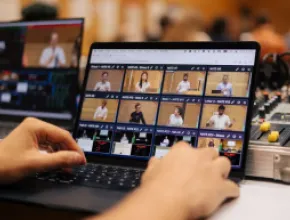It's safe to say few planners expect the meeting or event venues they contract to provide free food and beverage services. Yet many planners continue to expect free, consistent and constant internet connectivity in event venues, an expectation that has been tagged a "Starbucks mentality."
As attendees, presenters, exhibitors and venue managers carry more and more mobile devices and require more robust connectivity for video presentations and other data-rich features, venues are on the mat for providing constant connectivity for every device and online action. Keeping up with demand can mean upgrades of venue infrastructure costing millions of dollars every three years or less.
The prevailing expectation that reliable and speedy connectivity should be free is not realistic, say knowing people on both sides of the industry debate.
Instead of howling about inconsistent costs and dropped connections, industry experts say planners and venue managers need to educate themselves about issues surrounding bandwidth provision and Wi-Fi access for events. Achieving good connectivity has reached the same level of importance for attendee satisfaction, they advise, as basic components like food, beverage and room rates.
Getting What You Pay For
In response to demands for free Wi-Fi, some hotel brands and other venues offer and promote it. But free internet connect may sabotage attendee satisfaction more than an urn of cold coffee could.
Free Wi-Fi in guest rooms and/or event spaces might satisfy those who just want to manage email, but it's typically inadequate for an exhibit hall or meeting spaces where data flow demands can be high.
"Free is not a price point," says Michael Owen, president of Eventgenuity and chair of the APEX Standards Committee for the Convention Industry Council (CIC). "Most industry people don't understand the cost to venue owners for providing connectivity."
New beds and plumbing may last for 15 to 20 years in a hotel, Owen explained, but apparatus that keeps up with technology changes lasts about three years at most, and it's expensive to upgrade.
And, there's the expense of keeping things humming.
"Most of us have wireless in our homes and we deal with the same situation as a planner might in a hotel or other venue," Owen says. "One of the keys is support. At the coffee shop your tech support is nothing. If you're in a hotel room and the Wi-Fi goes out, you call the front desk and maybe you get the problem solved in a couple of hours. At your home, your provider will be out between eight and noon next Wednesday."
One big challenge today in pricing connectivity is that there are no standards, he said. It's the Wild West, with costs whatever the market will bear. Luxury hotels and full-service hotels typically surcharge connectivity more than budget-branded hotels that want to attract more price-conscious guests. While it may be easy to compare costs for a gallon of coffee, connectivity rates are all over the map.
Owen said rates a buyer gets can relate to how much they or their tech advisors know, and how many questions they ask a venue they are considering. The savvy buyer will educate herself about technology issues surrounding bandwidth, he said, and arrive at the negotiating table armed with usage history for her group. And then paying for bandwidth may come down to what Owen calls tiered pricing.
"It's like your event bar bill, that's based on consumption of standard brands of beer and wine or top-shelf liquors," says Owen. "Planners understand what level they want to deliver to people, and what makes them happy. In the bandwidth arena, this might mean robust data delivery in exhibit halls and meeting rooms for streaming and such, all the way down to 'free' for email access in sleep rooms."
Knowing Your Needs
Doug Rice, executive vice president and CEO of Hotel Technology Next Generation, says planners won't always get straight answers to their tech questions from hotel sales staff.
"Hotel salespeople often have limited or no understanding of a property's capabilities, so planners may need to confer with the company that provisions bandwidth for the property,” Rice says. “One of the things to ask about is whether the facility is able and willing to dedicate a portion of its bandwidth for an event. Most can do rough calculations of a group's needs, assuming they have a usage history. If the planner is running a large meeting with thousands of attendees, however, they need an outside tech advisor."
Planners need to obtain data on their event's bandwidth usage, right along with room and F&B consumption, advised John Rissi, senior vice president of operations for PSAV and chair of CIC's APEX Bandwidth and Connectivity Group.
"Planners should hold venues accountable for providing capability reports as well as a group's bandwidth usage, even though many don't have systems that do accurate reporting yet," says Rissi. "This is shameful, and as more meetings buyers hold managers responsible for this, venues that do good reporting will get the business. The situation is improving over what it was three years ago. Managers are realizing reports on usage are key considerations for bookings."
Online tools can help, such as the APEX – Event Bandwidth Estimator, and apps which measure how much bandwidth is available in a room. At Speedtest.net by Ookla, one can begin to determine whether they are getting the bandwidth speed they are paying for.
What's At Stake?
Bandwidth discussions may bore some planners and decision makers while others simply avoid them, say industry experts. But they do so at their peril.
"Having good connectivity is all about attendee ROI these days, says MaryAnne Bobrow, CAE, CMP, CMM, CHE, and president of Bobrow & Associates, who also serves on the APEX Bandwidth Workgroup. “Whether your attendees are high, medium, or low users of internet connectivity, you need to have sufficient bandwidth for people to do what they need to do. Otherwise, your event can be a disaster."
Connectivity is getting more complex by the day, she added, and it's one of the issues making it harder and harder for a planner to focus on the event itself because there is so much "side stuff" happening.
"My advice to planners is that they find and listen to an advisor whom they can trust in this realm," Bobrow says, "because it's getting more complicated by the day.
“That person may not have anything to do with the property under consideration, but they can educate you and prepare questions for you to ask venue managers about the house's infrastructure and whether it can provide the speed and level of network security you need."
Not only is speed of connectivity in the fore Bobrow said, there's now issue of cybersecurity and "who owns the airwaves" during your event. That's the next big item on the APEX Workgroup's plate.
Ruth A. Hill is a frequent contributor to Meetings Focus and its Hot Topic newsletter.






